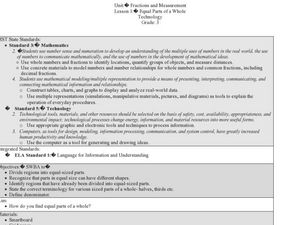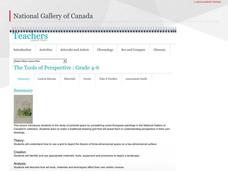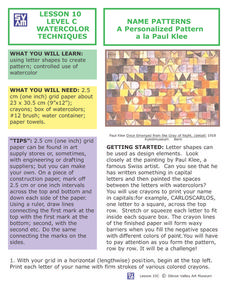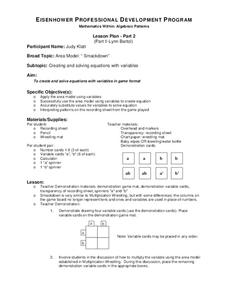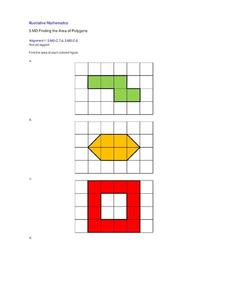Scientific American
Life-Sized Drawing
Ocean explorers or mathematicians research the wreck of the CSS H.L. Hunley. They investigate the actual dimensions of the Hunley using math and measuring skills. Afterward, they sketch a large scale drawing of the submarine outdoors on...
Curated OER
Drawing Lessons
Students recognize and respond to the content of visual art using art vocabulary. They recognize the differences between art materials, techniques, and processes.
Curated OER
Rainbow Fish Drawing
First graders read the book, RAINBOW FISH and view a few pictures of different types of fish. They discuss putting certain shapes together make up objects and talk about and demonstrate straight and wavy lines, thick and thin lines....
Curated OER
Fractions and Measurement
Using a Smart Board, or a plain ol' white board or chalkboard, the teacher pulls up a grid and demonstrates how squares and rectangles can be divided up into equal parts. The class will get their own graph paper to draw shapes and divide...
Curated OER
Weave Drawing - Pencils
Pupils create a work of art based on a theme showing skill in pencil shading. They create a work of art showing value contrast to center of interest. They use math concepts to enlarge a composition using a grid.
National Gallery of Canada
The Tools of Perspective
Make a study of perspective in the real world. Learners examine and discuss works of art that show examples of perspective before trying their own hands at it. Using a grid drawn on transparent paper, class members transfer a view from a...
Curated OER
Painting Package
Students use tools in a painting package to design tiles and create repeating patterns. They design a single tile using a 4 x 4 grid and experiment with changing the alignment of some of the tiles by rotating different areas.
Curated OER
Coordinate Planes
Identifying the location of ordered pairs on coordinate planes is the focus in the math lesson presented here. In it, 4th graders are introduced to coordinate pairs, the x/y axis, and the techniques associated with this type of graphing....
University of Colorado
Are All Asteroids' Surfaces the Same Age?
Did you know scientists can tell the age of an asteroid by looking closely at its craters? This final instructional activity of a six-part series focuses on two asteroids, Gaspra and Ida, in order to demonstrate the concept of dating...
Alabama Learning Exchange
Polygons-Changing Area Versus Changing Perimeter
Investigate the area and perimeter of polygons in this geometry lesson. Young geometers use grid paper to draw a quadrilateral and calculate its area and perimeter. They also read The Greedy Triangle to identify the changing shape of...
Curated OER
Searching the Attic
Students investigate an attic or basement to "discover" family artifacts. They develop a grid map using string, create a naming system for the grid, and analyze items of interest.
Curated OER
It's All In How You Look At It
Students work collaboratively to create artistic renderings of digital photographs using a color value scale and grid techniques in this late-elementary school lesson based upon Ted Rose's book Discovering Drawing. The lesson includes a...
Curated OER
Name Patterns
Here is a fun, colorful, and engaging art project that is sure to get your kids excited! They make a piece of art using watercolor paints, and by making a design out of the letters of their first name. This would be a fantasti art...
Curated OER
Searching the Attic
Students conduct field research, including the use of a grid system, in order to discover important or interesting family artifacts.They map discoveries of important artifacts on a grid map in order to track and better analyze...
Curated OER
Perimeter Playground
Students explore geometry by participating in a school measuring activity. In this perimeter lesson, students discuss the techniques and methods used in order to measure a large perimeter or geometric figure. Students utilize grid paper,...
Curated OER
CAD/CAM Project
Eighth graders are introduced to the CAD/CAM project for their grade level. Using software, they practice using grids and drawing their designs. They discover the need to plan their designs carefully and the importance of accuracy when...
Curated OER
Plenty of Pythagoras
Using a twelve foot knotted rope, students form a 3-4-5 right triangle. Following a discussion of observations about the lengths of the sides of the triangle, students use grid paper, scissors and a centimeter ruler to draw and measure...
Curated OER
"it's All in the Cellar"
Seventh graders examine the process of constructing a site plan map at archaeological sites. They discuss the process of mapping techniques and calculation of percentages, create a plan site map of a cellar at Jamestown, and calculate...
Curated OER
Face It!
Students explore the proportions of the human face and utilize a graph to draw a self portrait based upon the techniques and styles of a variety of artists.
Curated OER
Mathematics Within: Algebraic Patterns
Students analyze problem solving techniques for equations with variables by playing a game called "Smackdown". They place variable cards on a grid and use the area model to calculate an answer after spinning a game piece to determine the...
Curated OER
Heroes Portrait
Eighth graders investigate art appreciation and Renaissance portraits through time. They create a portrait.
National Security Agency
Awesome Area - Geometry and Measurement
Break out those math manipulatives, it's time to teach about area! Capturing the engagement of young mathematicians, this three-lesson series supports children with learning how to measure the area of squares, rectangles, and other...
Curated OER
Finding the Area of Polygons
Third graders are exposed to finding the area of polygons by decomposing figures and recomposing them into rectangles. This strategy allows children to expand on their prior knowledge of constructing shapes by rearranging parts into...
University of Colorado
Are All Asteroids' Surfaces the Same Age?
There are more than 600,000 asteroids in our solar system. Pupils analyze images of two asteroids in order to determine if they are the same age. They count craters for each asteroid and compare numbers.





